Chess in Armenia
Chess has been played in Armenia since the early Middle Ages; however, it was institutionalized during the early Soviet period.[2] Highly popular in Armenia today,[3][4][5] chess gained widespread recognition during the 1960s, when Soviet Armenian grandmaster Tigran Petrosian became the World Chess Champion.[2][6] A country of about three million people, Armenia is considered one of the strongest chess nations today,[7][8] and a chess superpower.[9][10] Among countries, Armenia has one of the most chess grandmasters per capita.[11]
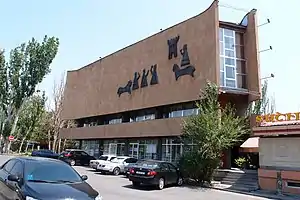
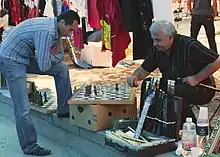
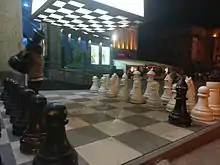
Since the country's independence, the Armenian men's chess team has won the European Team Championship (1999), the World Team Championship (2011) and the Chess Olympiad (2006, 2008, 2012). The women's team had its crowning victory at the 2003 European Championship. As of August 2021, Armenia ranks seventh in the world by the average rating of its top players.[12] Levon Aronian, formerly Armenia's best chess player, has placed as high as world No. 2 in the FIDE rankings, and has been a World Champion candidate on six occasions.
Since the 2011–12 school year, chess lessons have been made part of the curriculum in every public school in Armenia, making it the first country in the world to make chess mandatory in schools.[13][14]
Name
Until the early 20th century, chess was known in Armenian as čatrak (ճատրակ), from Middle Persian chatrang.[15][16] Another name was ճատրկուց, čatrkuts.[16] Today, that term—pronounced jadrag[17]—is only used in Western Armenian, which is spoken in the Armenian diaspora.[18] In modern Eastern Armenian, the variation used in Armenia, chess is known as šaxmat շախմատ ([ʃɑχmɑt]). It is derived from Russian šáxmaty (шахматы), itself a derivative from Persian šâh mât (شاه مات), literally meaning "the king is at a loss" or "the king is helpless."[19] The latter Persian phrase is also the etymology of the English checkmate.[20]
History
Early history
In their 1936 book on the history of chess, historians Joseph Orbeli and Kamilla Trever suggest that chess was known in Armenia since at least the 9th century during the Arab rule. According to them, the game was brought to Armenia by the Arabs from India,[21] where the game is believed to have been originated in the sixth century as Chaturanga.[22] In 1967 chess pieces were excavated by archaeologists in the citadel of Dvin, the medieval Armenian capital.[23] Chess is mentioned in manuscripts from the 12th–13th centuries, kept in the Matenadaran in Yerevan, including by Vardan Areveltsi and Mkhitar Anetsi.[24][16] Until the mid-20th century villagers in Shenavan, in the Aparan area, used homemade chess figures similar to medieval ones.[21][25]
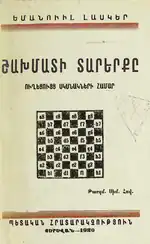
Soviet period
Chess in Armenia was institutionalized after the establishment of Soviet rule in 1920.[27] In 1926-27, chemist Simon Hovyan (1869-1942) spearheaded an initiative to introduce sections dedicated to chess in numerous Armenian newspapers. He played a crucial role in the widespread popularization of the game by providing lectures on the rules and strategy of chess, as well as translating books by Emanuel Lasker, Ilya Maizelis (ru), and Yakov Rokhlin (ru) into Armenian.[27]
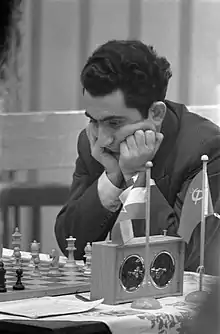
The first chess competitions were held in 1927, when the Armenian Chess Federation was founded.[28] Until 1934 chess players from Armenia competed in the Transcaucasian championship. In 1934 the first Armenian Chess Championship was held in Yerevan.[16] Genrikh Kasparyan became its winner. In later years Kasparyan won the championship nine times and became the most-titled Armenian chess player with ten national championship wins. The women's championship was also held the same year, Sirush Makints and Margarita Mirza-Avagian shared the champion title.[29][16] The first Armenian chess club was founded in Yerevan in 1936.[16] Chess clubs were also founded in Leninakan (now Gyumri) and Kirovakan (now Vanadzor) in the 1950s.[27] By the early 1980s all towns and districts (rayons) of Soviet Armenia had chess clubs.[16]
Chess became particularly popular with the unprecedented success of Tigran Petrosian in the 1960s. Born in Tiflis, the current capital of Armenia's neighbor Georgia, he started his ascent in Armenia with a 1946 victory at the national championship. He then won the Soviet champion title four times (1959, 1961, 1969, 1975). In 1963 Petrosian became the World Chess Champion, defeating Mikhail Botvinnik, another Soviet representative. Petrosian's victory not only popularized the game of chess, but also "led to an outpouring of patriotic fervour" in the smallest Soviet republic. "From that moment on, chess became a national obsession."[30] Many couples named their sons Tigran, after Petrosian.[30] Besides being World Champion for six years (1963 to 1969), Petrosian won the Chess Olympiad nine times with the Soviet team (1958 to 1974).[31]
The USSR Chess Championship was held in Yerevan twice, in 1962 and 1975.[32]
In 1962, there were 30,000 chess players in Soviet Armenia, as well as 3,000 instructors and judges. By 1986 the number of chess players had increased to 50,000, including three grandmasters: Rafael Vaganian, Smbat Lputian, and Arshak Petrosian.[27] In the late Soviet period, Rafael Vaganian (1989)[33] and Artashes Minasian (1991)[34] became Soviet Champions. Vaganian also won the Olympiad with the Soviet team twice in 1984 and 1986.[35]
Independent Armenia
Armenia gained its independence from the Soviet Union in 1991. Since then, Armenian chess players have had the opportunity to represent the Republic of Armenia. Three major chess tournaments have taken place in independent Armenia: the 32nd Chess Olympiad was held at the Sports & Music Complex in Yerevan in 1996;[36] the 2001 World Team Chess Championship and the 2014 European Individual Chess Championship were held at the Yerevan Opera Theater.[37][38]

Armenia earned its first medal at the 1992 Chess Olympiad, finishing third.[39] Armenia won bronze medals at the 2002 and 2004 Olympiads as well.[40][41] The Armenian team made a breakthrough with the sensational victory at the 2006 Chess Olympiad.[42] They also won the 2008[43] and 2012 Chess Olympiads.[44] Their record at the World Team Championships has been similarly outstanding, finishing third in 1997,[45] 2001,[46] and 2005,[47] and winning in 2011.[48] At the European championships the team performed somewhat more poorly, placing third in 1997,[49] first in 1999, and second in 2007.[50]
Chess in schools
In 2011, the Ministry of Education of Armenia made chess part of the primary school curriculum along with such standards as math and history for children over the age of 6.[51][52] Chess is compulsory for second, third and fourth graders.[14] Over $1.5 million was spent on the program. The inclusion of chess in schools was generally received positively by the public, but some parents claimed that their children's school program was already complicated and overloaded.[53] Grandmaster Smbat Lputian argued that "bringing chess into schools is the best way to build the future."[54] Grandmaster Rafael Vaganian criticized the program as "farce."[55]
The decision was widely reported in the international media. Journalists, chess experts and officials in various countries praised the program and advised its adoption in their respective countries.[56][57] During his visit to Armenia in 2014 Magnus Carlsen stated: "I think Armenia's experience of teaching chess in schools is a great example for the whole world."[58] As of 2020, chess is taught in grades 2 to 4 with two classes a week.[59]
| Year | Number |
|---|---|
| 2005[60] | 1,846 |
| 2010[61] | 2,893 |
| 2021[62] | 4,969 |
Recent developments
On December 12, 2019 the United Nations (UN) designated 20 July as World Chess Day as proposed by the Armenian delegation. It marks the date in 1924 when the International Chess Federation was established.[63]
As of 2021, Armenia's statistics agency recorded 4,969 chess players (including 1,318 females), up from 1,846 (375 females) in 2005 and 184 coaches (including 36 females) up from 87 (17 females) in 2005.[60][62]
In August 2022, when he met with the men's team that won a silver medal at the 44th Chess Olympiad, Armenia's Prime Minister Nikol Pashinyan said Armenia should aim to win the World Chess Championship by 2050. His government has listed it as a strategic goal for Armenia.[64]
Armenian diaspora
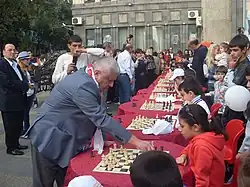
A number of ethnic Armenian chess players have achieved success outside of Armenia. Most notably, in 1985, Garry Kasparov, born in Baku, Soviet Azerbaijan to an Armenian mother and Russian Jewish father,[65] became World Champion. Although he never represented Armenia and is only half-Armenian, some sources preferred to call him Armenian,[66] partly because his last name is the Russified form of his mother's Armenian last name Kasparyan.[66]
Other notable Armenian diaspora chess players include[67] Sergei Movsesian (Czech Republic, Slovakia), Yury Dokhoian[68] and David Paravyan (Russia), Levon Ashotovich Grigorian (Uzbekistan), Tatev Abrahamyan, Samuel Sevian, Varuzhan Akobian, Melikset Khachiyan (United States), Dina Kagramanov and Natalia Khoudgarian (Canada), José Bademian Orchanian (Uruguay), Krikor Mekhitarian (Brazil), Knarik Mouradian (Lebanon).
Institutions
The national governing body for chess, the Armenian Chess Federation, was founded in 1927.[28] Serzh Sargsyan, then Defense Minister, was elected its president in 2004 and was reelected in 2011.[69] Sargsyan "is known for enthusiastically supporting Armenian chess players."[56] On one occasion, Sargsyan stated that "We don't want people to know Armenia just for the earthquake and the genocide. We would rather it was famous for its chess."[30] The Armenian government provides grandmasters with salaries and perks.[6][14]
The Chess Academy of Armenia (Հայաստանի շախմատի ակադեմիա) is a leading education institutions of chess in Armenia. It was founded in 2002 by the initiative of Grandmaster Smbat Lputian and supported by then-Prime Minister Andranik Margaryan. The academy has also organized international and national chess tournaments.[70]
National championship
The first Armenian championship occurred in 1934 when it was part of the Transcaucasian SFSR. Championships were held sporadically in the Armenian SSR until 1945, when they became an annual event; this practice has been continued in independent Armenia. Genrikh Kasparyan has won it the most times (10 times), followed by Ashot Anastasian (8 times), Levon Grigorian (6 times) and Artashes Minasian (6 times).[71]
The first woman's championship also took place in 1934, but was not held again till 1939. Some of the most notable women champions include Elina Danielian (6 times), Lilit Mkrtchian (4 times) and Siranush Andriasian (3 times).[29]
Media

In 1972, the magazine Chess in Armenia (Շախմատային Հայաստան Shakhmatayin Hayastan) was founded by Gaguik Oganessian. It was published monthly until 1997, when it became a weekly magazine.[72] In 1972, the TV show Chess-64 (originally named Chess School) started to be aired by the Public Television of Armenia. Hosted by Gaguik Oganessian, it is the "longest lived program series" in the channel's history.[73] Another more recently created show, Chess World, is aired after the First News.[74]
Individual statistics
FIDE, the World Chess Federation, lists 24 active Armenian grandmasters, 4 woman grandmasters, 17 international masters and 4 woman international masters.[75]
Men
The Top 10 Armenian grandmasters as of August 2022 are listed below.[76]
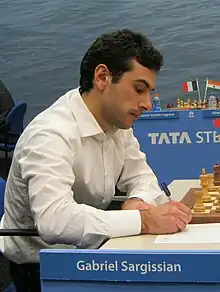
| # | Player | Birth year | GM Title | Rating | World rank[lower-alpha 1] |
|---|---|---|---|---|---|
| 1 | Gabriel Sargissian | 1983 | 2002 | 2698 | 40 |
| 2 | Haik M. Martirosyan | 2000 | 2017 | 2666 | 82 |
| 3 | Shant Sargsyan | 2002 | 2019 | 2661 | 90 |
| 4 | Hrant Melkumyan | 1989 | 2008 | 2660 | 125 |
| 5 | Karen H. Grigoryan | 1995 | 2013 | 2631 | 132 |
| 6 | Samvel Ter-Sahakyan | 1993 | 2009 | 2625 | 148 |
| 7 | Sergei Movsesian | 1978 | 1997 | 2619 | 159 |
| 8 | Aram Hakobyan | 2001 | 2018 | 2612 | 180 |
| 9 | Manuel Petrosyan | 1998 | 2017 | 2610 | 184 |
| 10 | Robert Hovhannisyan | 1991 | 2010 | 2599 | 207 |
Women
The Top 10 women Armenian chess players are listed below as of August 2022.[77]
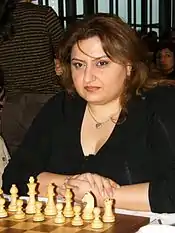
| # | Player | Birth year | Title | Rating | World rank[lower-alpha 2] |
|---|---|---|---|---|---|
| 1 | Elina Danielian | 1978 | GM | 2441 | 30 |
| 2 | Anna M. Sargsyan | 2001 | IM | 2378 | 74 |
| 3 | Lilit Mkrtchian | 1982 | IM | 2362 | 95 |
| 4 | Mariam Mkrtchyan | 2004 | WIM | 2285 | - |
| 5 | Susanna Gaboyan | 2001 | WIM | 2270 | - |
| 6 | Maria Gevorgyan | 1994 | WGM | 2216 | - |
| 7 | Siranush Andriasian | 1986 | WIM | 2198 | - |
| 8 | Siranush Ghukasyan | 1998 | WIM | 2154 | - |
| 9 | Armine Babayan | 1990 | - | 2143 | - |
| 10 | Anna Khachatryan | 2001 | WFM | 2116 | - |
Team records
Chess Olympiads
- Open (Men's)
| Year | Event | Location | Players | Position | Ref |
|---|---|---|---|---|---|
| 1992 | 30th Chess Olympiad | Vaganian, Akopian, Lputian, Minasian, A. Petrosian, Anastasian | [39] | ||
| 1994 | 31st Chess Olympiad | Vaganian, Akopian, Lputian, Anastasian, Minasian, Yegiazarian | 13 | [78] | |
| 1996 | 32nd Chess Olympiad | Akopian, Vaganian, Lputian, Minasian, Anastasian, A. Petrosian | 5 | [79] | |
| 1998 | 33rd Chess Olympiad | Vaganian, Lputian, Akopian, Minasian, Asrian, Anastasian | 16 | [80] | |
| 2000 | 34th Chess Olympiad | Vaganian, Lputian, Minasian, Anastasian, Asrian, Sargissian | 17 | [81] | |
| 2002 | 35th Chess Olympiad | Akopian, Lputian, Asrian, Sargissian, Minasian, Anastasian | [40] | ||
| 2004 | 36th Chess Olympiad | Akopian, Aronian, Vaganian, Lputian, Sargissian, Minasian | [41] | ||
| 2006 | 37th Chess Olympiad | Aronian, Akopian, Asrian, Lputian, Sargissian, Minasian | [42] | ||
| 2008 | 38th Chess Olympiad | Aronian, Akopian, Sargissian, T. Petrosian, Minasian | [43] | ||
| 2010 | 39th Chess Olympiad | Aronian, Akopian, Sargissian, Pashikian, Grigoryan | 7 | [82] | |
| 2012 | 40th Chess Olympiad | Aronian, Movsesian, Akopian, Sargissian, T. Petrosian | [44] | ||
| 2014 | 41st Chess Olympiad | Aronian, Sargissian, Movsesian, Akopian, Kotanjian | 8 | [83] | |
| 2016 | 42nd Chess Olympiad | did not participate | — | — | |
| 2018 | 43rd Chess Olympiad | Aronian, Sargissian, Melkumyan, Hovhannisyan, Martirosyan | 8 | [84] | |
| 2022 | 44th Chess Olympiad | Sargissian, Melkumyan, Ter-Sahakyan, Petrosyan, R. Hovhannisyan | [85] | ||
- Women's
| Year | Event | Location | Players | Position | Ref |
|---|---|---|---|---|---|
| 1992 | 30th Chess Olympiad | Aslanian, Khalafian, Danielian, Karakashian | 33 | [86] | |
| 1994 | 31st Chess Olympiad | Danielian, Aslanian, Grigorian, Airapetian | 24 | [87] | |
| 1996 | 32nd Chess Olympiad | Danielian, Hlgatian, Mkrtchian, Khalafian | 20 | [88] | |
| 1998 | 33rd Chess Olympiad | Danielian, Hlgatian, Mkrtchian, Aginian | 21 | [89] | |
| 2000 | 34th Chess Olympiad | Danielian, Mkrtchian, Hlgatian, Aginian | 10 | [90] | |
| 2002 | 35th Chess Olympiad | Danielian, Mkrtchian, Hlgatian, Galojan | 15 | [91] | |
| 2004 | 36th Chess Olympiad | Danielian, Mkrtchian, Aginian, Andriasian | 11 | [41] | |
| 2006 | 37th Chess Olympiad | Mkrtchian, Danielian, Aginian, Andriasian | 8 | [92] | |
| 2008 | 38th Chess Olympiad | Danielian, Mkrtchian, Aginian, Galojan, Andriasian | 6 | [93] | |
| 2010 | 39th Chess Olympiad | Danielian, Mkrtchian, Galojan, Aginian, Kharatian | 11 | [94] | |
| 2012 | 40th Chess Olympiad | Danielian, Mkrtchian, Galojan, Kursova, Hairapetian | 6 | [95] | |
| 2014 | 41st Chess Olympiad | Danielian, Mkrtchian, Galojan, Kursova, Sargsyan | 5 | [96] | |
| 2016 | 42nd Chess Olympiad | did not participate | |||
| 2018 | 43rd Chess Olympiad | Danielian, Mkrtchian, Sargsyan, Kursova, Ghukasyan | 6 | [97] | |
World Team Championships
- Men's
| Year | Location | Players | Position | Ref |
|---|---|---|---|---|
| 1993 | Vaganian, Akopian, Lputian, Minasian, Anastasian, Petrosian | 4 | [98] | |
| 1997 | Akopian, Vaganian, Lputian, Minasian, Anastasian, Khachiyan | [45] | ||
| 2001 | Akopian, Vaganian, Lputian, Asrian, Anastasian, Minasian | [46] | ||
| 2005 | Aronian, Akopian, Asrian, Vaganian, Lputian, Anastasian | [47] | ||
| 2010 | Aronian, Akopian, Sargissian, Pashikian, Petrosian, Kotanjian | 5 | [99] | |
| 2011 | Aronian, Movsesian, Akopian, Sargissian, Hovhannisyan | [48] | ||
| 2013 | Aronian, Movsesian, Akopian, Sargissian, Petrosian | 5 | [100] | |
| 2015 | Aronian, Sargissian, Movsesian, Akopian, Melkumyan | [101] | ||
| 2017 | did not participate | |||
| 2019 | did not participate | |||
- Women's
| Year | Location | Players | Position | Ref |
|---|---|---|---|---|
| 2007 | Danielian, Mkrtchian, Aginian, Andriasian, Aghabekian | 8 | [102] | |
| 2009 | Danielian, Mkrtchian, Galojan, Aginian, Andriasian | 5 | [103] | |
| 2011 | Danielian, Mkrtchian, Galojan, Kursova, Aginian | 6 | [104] | |
| 2013 | did not participate[105] | |||
| 2015 | Danielian, Mkrtchian, Galojan, Kursova, Gaboyan | 7 | ||
| 2017 | did not participate | |||
| 2019 | 8 | [106] | ||
European Team Championships
- Men's
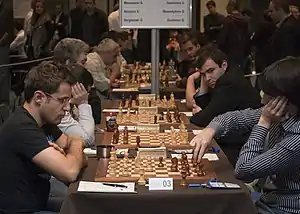
| Year | Location | Players | Position | Ref |
|---|---|---|---|---|
| 1992 | Vaganian, Akopian, Lputian, Minasian, Anastasian | 19 | [107] | |
| 1997 | Akopian, Vaganian, Lputian, Minasian, Anastasian | [49] | ||
| 1999 | Lputian, Minasian, Anastasian, Petrosian | [108] | ||
| 2001 | did not participate[109] | |||
| 2003 | did not participate[110] | |||
| 2005 | Akopian, Aronian, Vaganian, Lputian, Anastasian | 12 | [111] | |
| 2007 | Aronian, Akopian, Sargissian, Asrian, Lputian | [50] | ||
| 2009 | Aronian, Akopian, Sargissian, Pashikian, Petrosian | 4 | [112] | |
| 2011 | Aronian, Movsesian, Akopian, Sargissian, Hovhannisyan | 4 | [113] | |
| 2013 | Aronian, Movsesian, Akopian, Sargissian, Petrosian | 4 | [114] | |
| 2015 | Aronian, Sargissian, Movsesian, Melkumyan, Grigoryan | [50] | ||
| 2017 | ||||
- Women's
| Year | Location | Players | Position | Ref |
|---|---|---|---|---|
| 1992 | Aslanian, Hlgatian, Grigorian | 19 | [115] | |
| 1997 | Danielian, Hlgatian, Mkrtchian | 5 | [116] | |
| 1999 | Danielian, Mkrtchian, Hlgatian | 5 | [117] | |
| 2001 | did not participate[118] | |||
| 2003 | Danielian, Mkrtchian, Aginian | [119] | ||
| 2005 | Danielian, Mkrtchian, Aginian, Andriasian, Galojan | 6 | [120] | |
| 2007 | Danielian, Mkrtchian, Aginian, Andriasian, Aghabekian | [121] | ||
| 2009 | Danielian, Mkrtchian, Galojan, Aginian, Andriasian | 5 | [122] | |
| 2011 | Danielian, Mkrtchian, Galojan, Kursova, Aginian | 7 | [123] | |
| 2013 | Danielian, Mkrtchian, Galojan, Kursova, Hairapetian | 5 | [124] | |
Club championships
In 1995, the Yerevan city club won the European Chess Club Cup men's tournament.[125] In 2006, the Yerevan MIKA club won the European Club Cup women's tournament.[126]
See also
References
Notes
- active players only
- active female players only
Citations
- "Շախմատի տուն [House of Chess]". chesshouse.am (in Armenian). Chess House after Tigran Petrosian. Archived from the original on 8 August 2021.
- "In Armenia chess is king and grandmasters are stars". The Independent. 13 May 2010. Archived from the original on 15 September 2014.
- "Compulsory chess lessons might be making Armenia's kids supersmart". msnNOW. Microsoft. 25 March 2013. Archived from the original on 28 September 2013.
- Shahrigian, Shant; Werman, Marco (1 November 2011). "Learning Chess in Elementary School". The World. Public Radio International. Archived from the original on 15 September 2014.
- Garry Kasparov has compared the popularity of chess in Armenia with the popularity of football (soccer) in Latin America. "Garry Kasparov: "There's No Doubt That Carlsen Is the Strongest Player"". Chess-News.ru. 1 October 2012. Archived from the original on 15 September 2014.
In Armenia chess became something like soccer in Latin America and it's even an obvious subject at schools.
- Parkinson, Joe (3 December 2012). "Winning Move: Chess Reigns as Kingly Pursuit in Armenia". The Wall Street Journal. Archived from the original on 8 August 2021.
- Moss, Stephen (16 November 2011). "Armenia's killer chess move". The Guardian. Archived from the original on 11 May 2021.
Armenia is an obsessive chess-playing country, one of the strongest in the world despite a population that is the same as – yes, you guessed it – Wales.
- "Armenia: the cleverest nation on earth". BBC World Service. 19 October 2009. Archived from the original on 3 May 2021.
- Chakelian, Anoosh (May 24, 2014). "Armenia Is an International Superpower—at Chess". The New Republic. Archived from the original on 4 September 2022.
- "Speech by President Sargsyan on the occasion of the gold victory of the men's national chess team at the World Chess Olympiad". president.am. The Office to the President of the Republic of Armenia. 26 November 2008. Archived from the original on 28 February 2021.
The Armenian chess players through their splendid performance, talent and will power proved once again that our country is a chess superpower.
- "Armenia Wins World Chess Title, Ukraine Takes Third". Radio Free Europe/Radio Liberty. 27 July 2011. Archived from the original on 5 May 2021.
Chess has been one of Armenia's most popular sports since Tigran Petrosian, a Tbilisi-born Armenian, became a world champion in 1963. The country currently boasts one of the largest per capita numbers of chess grandmasters in the world.
- "Federations Ranking". fide.com. World Chess Federation. Archived from the original on 2017-12-27. Retrieved 2012-09-19.
- Akhmeteli, Nina (19 January 2012). "Chess lessons introduced to the curriculum in Armenian schools". BBC News. Archived from the original on 8 November 2020.
- Parameswaran; Gaedtke, Gayatri; Felix (24 March 2013). "Chess mania captures Armenia's attention". Al Jazeera. Archived from the original on 11 November 2020.
{{cite news}}: CS1 maint: multiple names: authors list (link) - Adjarian, Hrachia (1926). Հայերեն Արմատական Բառարան [Armenian Etymological Dictionary] (in Armenian). Vol. 3. Yerevan University Press. p. 190.
- Petrosian, Tigran; Hakobian, G. (1982). "Շախմատ [Chess]". Soviet Armenian Encyclopedia (in Armenian). Vol. 8. Yerevan: Armenian Encyclopedia. pp. 414–415.
- Awde, Nicholas; Davidian, Vazken-Khatchig (2006). Western Armenian Dictionary & Phrasebook. New York: Hippocrene Books. p. 168. ISBN 978-0-7818-1048-7.
- Kouyoumdjian, Mesrob G. (1981). Ընդարձակ Բառարան Անգլիերէնէ Հայերէն [A Comprehensive English - Armenian Dictionary]. Beirut: G. Doniguian & Fils. p. 226.
- Chess: East and West, Past and Present. New York: Metropolitan Museum of Art. 1968. p. xxv.
- "checkmate (n.)". etymonline.com. Online Etymology Dictionary. Archived from the original on 6 March 2021.
- Orbeli, Joseph; Trever, Kamilla (1936). Шатранг. Книга о шахматах [Shatrang: The Book of Chess] (in Russian). Saint Petersburg: State Hermitage. p. 195. OCLC 82233681.
- United States Chess Federation; Kurzdorfer, Peter (2003). The Everything Chess Basics Book. Avon, Massachusetts: Adams Media. p. 2. ISBN 978-1-4405-2229-1.
Chess is a descendant of a game called Chaturanga believed to have originated in India in the sixth century and which may have been related to a much older Chinese game.
- Ghafadarian, Karo (1970). "Հնագիտական աշխատանքը Հայաստանում սովետական շրջանում [Archaeological Research in Armenia in Soviet Years]". Patma-Banasirakan Handes (in Armenian). Yerevan: Armenian Academy of Sciences (3): 16. Archived from the original on 2018-09-20. Retrieved 2013-12-07.
- Thomson, Robert W. (1989). "The Historical Compilation of Vardan Arewelcʿi". Dumbarton Oaks Papers. 43: 192. doi:10.2307/1291609. JSTOR 1291609.
- Arakelian, Babken N. (1977). "Ակադեմիկոս Հովսեփ Օրբելի (Ծննդյան 90-ամյակի առթիվ) [Academician Hovsep Orbeli (on his 90th birth anniversary)]". Patma-Banasirakan Handes (in Armenian). Yerevan: Armenian National of Sciences (1): 27. Archived from the original on 2017-11-13. Retrieved 2013-12-07.
- Lasker, Emanuel (1930). Շախմատի տարերքը: Ուղեցույց սկսնակների համար [Lasker's How to Play Chess: An Elementary Text Book for Beginners] (in Armenian). Translated by Simon Hovyan. Yerevan: Pethrat.
- Karpov, Anatoly, ed. (1990). "Армения [Armenia]". Шахматы: Энциклопедический словарь (in Russian). Moscow: Советская энциклопедия. p. 21. ISBN 978-5-85270-005-6. LCCN 97214322. OCLC 23533106.
- "Info – Federation". Armenian Chess Federation. Archived from the original on 22 March 2012. Retrieved 16 September 2012.
- "All Women's Champions of Armenia". Chess in Armenia Magazine. Archived from the original on 30 September 2011. Retrieved 1 September 2013.
- "Armenia revels in its chess prowess". BBC News. 26 September 2009. Archived from the original on 13 December 2013. Retrieved 25 August 2013.
- "Petrosian, Tigran". OlimpBase. Archived from the original on 11 December 2013. Retrieved 25 August 2013.
- Gabelli, Giuseppe. "The Soviet Chess Championship 1920-1991". Archived from the original on 28 January 2008.
- "Vaganian Rafael Artemovich". Chess Network Company. Archived from the original on 23 September 2015. Retrieved 24 August 2013.
- "Minasian Artashes". Chess Network Company. Archived from the original on 23 September 2015. Retrieved 24 August 2013.
- "Vaganian, Rafael". OlimpBase. Archived from the original on 25 June 2014. Retrieved 24 August 2013.
- "32nd Chess Olympiad: Yerevan 1996". OlimpBase. Archived from the original on 6 October 2014. Retrieved 12 September 2012.
- "5th World Team Chess Championship: Yerevan 2001". OlimpBase. Archived from the original on 15 April 2012. Retrieved 12 September 2012.
- "European Individual Chess Championship launches in Yerevan". Armenpress. 3 March 2014. Archived from the original on 16 March 2014. Retrieved 16 March 2014.
- "30th Chess Olympiad: Manila 1992". OlimpBase. Archived from the original on 27 September 2012. Retrieved 9 September 2012.
- "35th Chess Olympiad: Bled 2002". OlimpBase. Archived from the original on 30 September 2012. Retrieved 9 September 2012.
- "36th Chess Olympiad: Calvia 2004". OlimpBase. Archived from the original on 30 September 2012. Retrieved 9 September 2012.
- "37th Chess Olympiad: Turin 2006". OlimpBase. Archived from the original on 9 October 2014. Retrieved 9 September 2012.
- "38th Chess Olympiad: Dresden 2008". OlimpBase. Archived from the original on 28 August 2012. Retrieved 9 September 2012.
- "40th Olympiad Istanbul 2012 Open tournament". Turkish Chess Federation. Archived from the original on 2012-09-05. Retrieved 9 September 2012.
- "4th World Team Chess Championship: Lucerne 1997". OlimpBase. Archived from the original on 1 May 2012. Retrieved 9 September 2012.
- "5th World Team Chess Championship: Yerevan 2001". OlimpBase. Archived from the original on 1 May 2012. Retrieved 9 September 2012.
- "6th World Team Chess Championship: Beer Sheva 2005". OlimpBase. Archived from the original on 1 May 2012. Retrieved 9 September 2012.
- "8th World Team Chess Championship: Ningbo 2011". OlimpBase. Archived from the original on 28 June 2012. Retrieved 9 September 2012.
- "11th European Team Chess Championship: Pula 1997". OlimpBase. Archived from the original on 28 January 2013. Retrieved 9 September 2012.
- "16th European Team Chess Championship: Heraklion 2007". OlimpBase. Archived from the original on 28 January 2013. Retrieved 9 September 2012.
- "Armenia Introduces Chess As Mandatory School Subject". Radio Free Europe/Radio Liberty. 19 September 2011. Archived from the original on 12 September 2012. Retrieved 12 September 2012.
- "Armenia makes chess compulsory in schools". The Guardian. 15 November 2011. Archived from the original on 1 October 2013. Retrieved 12 September 2012.
- Hakobyan, Julia (26 April 2013). "Reading, Writing, Chess: Experts evaluate Armenia's progress on introducing the oldest board game at primary schools". ArmeniaNow. Archived from the original on 20 June 2015. Retrieved 28 April 2013.
- Grigoryan, Marianna (27 July 2011). "Armenia: Can Chess "Build the Country's Future?"". EurasiaNet. Archived from the original on 27 August 2013. Retrieved 25 August 2013.
- "Գրոսմայստեր Ռաֆայել Վահանյանը դեմ է դպրոցներում շախմատի դասավանդմանը" (in Armenian). A1plus. 17 December 2019. Archived from the original on 18 December 2019.
- Fraiman, Michael. "Armenia's gambit to become chess superpower". National Post. Retrieved 15 September 2014. Alt URL
- Berezow, Alex (15 April 2013). "Why Chess Should Be Required in U.S. Schools". Pacific Standard. Archived from the original on 15 September 2014.
- "Carlsen: World should take example from Armenia". sport.news.am. 23 June 2014. Archived from the original on 23 June 2014.
- "Իրազեկում. «Շախմատ» [Announcement on Chess]". escs.am (in Armenian). Ministry of Education, Science, Culture and Sport of the Republic of Armenia. 9 August 2020. Archived from the original on 13 August 2022.
- "Սպորտային կազմակերպությունների գործունեությունը 2005 թվականին" (PDF). armstat.am (in Armenian). Statistical Committee of the Republic of Armenia. Archived from the original (PDF) on 19 April 2021.
- "Սպորտային կազմակերպությունների գործունեությունը 2010 թվականին" (PDF). armstat.am (in Armenian). Statistical Committee of the Republic of Armenia. Archived from the original (PDF) on 18 May 2021.
- "Սպորտային կազմակերպությունների գործունեությունը 2021 թվականին" (PDF). armstat.am (in Armenian). Statistical Committee of the Republic of Armenia. Archived from the original (PDF) on 10 August 2022.
- "General Assembly Adopts Three Resolutions on Culture of Peace, Highlighting Need to Foster Interreligious Dialogue, Moderate Social Media". un.org. 12 December 2019. Archived from the original on 13 December 2019.
- "Պատրաստ ենք բոլոր ջանքերը գործադրել՝ զարգացման հաջորդ քայլն անելու համար. վարչապետը պարգևատրել է ՀՀ շախմատի տղամարդկանց հավաքականի անդամներին [We are ready to make all efforts to take the next step of development. The Prime Minister awarded the members of the RA men's chess team]". primeminister.am (in Armenian). The Office to the Prime Minister of the Republic of Armenia. 12 August 2022. Archived from the original on 13 August 2022.
- Saunders, Robert A.; Strukov, Vlad (2010). Historical Dictionary of the Russian Federation. Lanham, Md.: Scarecrow Press. p. 299. ISBN 978-0-8108-7460-2.
- Byrne, Robert (11 July 2004). "CHESS; Even Loosely Defined, Armenia Can't Beat the Rest of the World". New York Times. Archived from the original on 16 September 2014. Retrieved 15 September 2014.
Kasparov was dubbed Armenian because his mother is Armenian.
- Terekhov, Andrey (May 21, 2020). "Армянское шахматное чудо". chess24.com (in Russian). chess24.com. Archived from the original on 7 August 2021.
- McClain, Dylan Loeb (July 9, 2021). "Yury Dokhoian, Chess Coach Who Guided Kasparov, Dies at 56". The New York Times. Archived from the original on August 7, 2021. Retrieved August 7, 2021.
- "Serzh Sargsyan re-elected President of Armenian Chess Federation". Chessdom. 2 February 2011. Archived from the original on 26 September 2013. Retrieved 12 September 2012.
- "The History of Academy". Chess Academy. Archived from the original on 24 December 2013. Retrieved 21 December 2013.
- "All champions of Armenia". Chess in Armenia Magazine. Archived from the original on 20 January 2012. Retrieved 8 September 2013.
- "Chess in Armenia (Shakhmatayin Hayastan), Armenia". FIDE. Archived from the original on 2 December 2013. Retrieved 3 September 2013.
- "Chess-64". Public Television of Armenia. Archived from the original on 2 September 2013. Retrieved 8 September 2013.
- "Chess World". Public Television of Armenia. Archived from the original on 2 November 2012. Retrieved 8 September 2013.
- "General ratings statistics for Armenia". World Chess Federation (FIDE). Archived from the original on 12 December 2013. Retrieved 28 August 2013.
- "Federations Ranking: Armenia". World Chess Federation (FIDE). Archived from the original on 1 July 2018. Retrieved 9 August 2022.
- "Federations Ranking: Armenia, Women". World Chess Federation (FIDE). Archived from the original on 1 July 2018. Retrieved 28 September 2018.
- "31st Chess Olympiad: Moscow 1994". OlimpBase. Archived from the original on 30 September 2012. Retrieved 9 September 2012.
- "32nd Chess Olympiad: Yerevan 1996". OlimpBase. Archived from the original on 30 September 2012. Retrieved 9 September 2012.
- "33rd Chess Olympiad: Elista 1998". OlimpBase. Archived from the original on 21 September 2012. Retrieved 9 September 2012.
- "34th Chess Olympiad: Istanbul 2000". OlimpBase. Archived from the original on 30 September 2012. Retrieved 9 September 2012.
- "39th Chess Olympiad: Khanty-Mansiysk 2010". OlimpBase. Archived from the original on 2 October 2012. Retrieved 9 September 2012.
- Bartelski, Wojciech. "41st Chess Olympiad: Tromsø 2014". OlimpBase. Archived from the original on 13 January 2021.
- Bartelski, Wojciech. "43rd Chess Olympiad: Batumi 2018". OlimpBase. Archived from the original on 21 July 2021.
- "44th Chess Olympiad: Chennai 2022". Chess Olympiad.
- "30th Chess Olympiad (women): Manila 1992". OlimpBase. Archived from the original on 23 October 2013. Retrieved 9 September 2012.
- "31st Chess Olympiad (women): Moscow 1994". OlimpBase. Archived from the original on 11 December 2013. Retrieved 9 September 2012.
- "32nd Chess Olympiad (women): Yerevan 1996". OlimpBase. Archived from the original on 2 December 2013. Retrieved 9 September 2012.
- "33rd Chess Olympiad (women): Elista 1998". OlimpBase. Archived from the original on 23 October 2012. Retrieved 9 September 2012.
- "34th Chess Olympiad (women): Istanbul 2000". OlimpBase. Archived from the original on 23 October 2012. Retrieved 9 September 2012.
- "35th Chess Olympiad (women): Bled 2002". OlimpBase. Archived from the original on 11 November 2013. Retrieved 9 September 2012.
- "37th Chess Olympiad (women): Turin 2006". OlimpBase. Archived from the original on 23 October 2012. Retrieved 9 September 2012.
- "38th Chess Olympiad (women): Dresden 2008". OlimpBase. Archived from the original on 22 October 2012. Retrieved 9 September 2012.
- "39th Chess Olympiad (women): Khanty-Mansiysk 2010". OlimpBase. Archived from the original on 23 October 2012. Retrieved 9 September 2012.
- "40th Olympiad Istanbul 2012 Women tournament". Turkish Chess Federation. Archived from the original on 2012-08-30. Retrieved 9 September 2012.
- Bartelski, Wojciech. "41st Chess Olympiad (women): Tromsø 2014". OlimpBase. Archived from the original on 5 November 2019.
- "43rd Olympiad Batumi 2018 Women". chess-results.com. Archived from the original on 1 December 2020.
- "3rd World Team Chess Championship: Lucerne 1993". OlimpBase. Archived from the original on 16 October 2012. Retrieved 9 September 2012.
- "7th World Team Chess Championship: Bursa 2010". OlimpBase. Archived from the original on 24 June 2012. Retrieved 9 September 2012.
- Bartelski, Wojciech. "9th World Team Chess Championship: Antalya 2013". OlimpBase. Archived from the original on 7 July 2020.
- Bartelski, Wojciech. "10th World Team Chess Championship: Tsakhkadzor 2015". OlimpBase. Archived from the original on 7 July 2020.
- "1st World Team Chess Championship (women): Ekaterinburg 2007". OlimpBase. Archived from the original on 11 December 2013. Retrieved 9 September 2012.
- "2nd World Team Chess Championship (women): Ningbo 2009". OlimpBase. Archived from the original on 3 December 2013. Retrieved 9 September 2012.
- "FIDE Women's World Chess Team Championship – 2011". FIDE Women's World Chess Team Championship 2011 / Turkish Chess Federation. Archived from the original on 17 April 2012. Retrieved 9 September 2012.
- "Women's World Chess Team Championship Astana, Kazakhstan, 2-13 March 2013 Final Ranking". FIDE Women World Team Championship 2013. Archived from the original on 8 May 2013. Retrieved 6 December 2013.
- "Chess-Results Server Chess-results.com - FIDE Women's World Team Championship 2019". Archived from the original on 2021-08-08. Retrieved 2021-08-08.
- "10th European Team Chess Championship: Debrecen 1992". OlimpBase. Archived from the original on 4 September 2012. Retrieved 9 September 2012.
- "12th European Team Chess Championship: Batumi 1999". OlimpBase. Archived from the original on 28 January 2013. Retrieved 9 September 2012.
- "13th European Team Chess Championship: Leon 2001". OlimpBase. Archived from the original on 28 January 2013. Retrieved 9 September 2012.
- "14th European Team Chess Championship: Plovdiv 2003". OlimpBase. Archived from the original on 28 January 2013. Retrieved 9 September 2012.
- "15th European Team Chess Championship: Gothenburg 2005". OlimpBase. Archived from the original on 11 December 2013. Retrieved 9 September 2012.
- "17th European Team Chess Championship: Novi Sad 2009". OlimpBase. Archived from the original on 11 December 2013. Retrieved 9 September 2012.
- "18th European Team Chess Championship: Porto Carras 2011". OlimpBase. Archived from the original on 26 July 2013. Retrieved 9 September 2012.
- "European Team Championship 2013". ETCC 2013. Archived from the original on 10 December 2013. Retrieved 10 September 2016.
- "1st European Team Chess Championship (women): Debrecen 1992". OlimpBase. Archived from the original on 3 December 2013. Retrieved 9 September 2012.
- "2nd European Team Chess Championship (women): Pula 1997". OlimpBase. Archived from the original on 3 December 2013. Retrieved 9 September 2012.
- "3rd European Team Chess Championship (women): Batumi 1999". OlimpBase. Archived from the original on 2 December 2013. Retrieved 9 September 2012.
- "4th European Team Chess Championship (women): Leon 2001". OlimpBase. Archived from the original on 23 October 2012. Retrieved 9 September 2012.
- "5th European Team Chess Championship (women): Plovdiv 2003". OlimpBase. Archived from the original on 25 May 2012. Retrieved 9 September 2012.
- "6th European Team Chess Championship (women): Gothenburg 2005". OlimpBase. Archived from the original on 11 November 2013. Retrieved 9 September 2012.
- "7th European Team Chess Championship (women): Heraklion 2007". OlimpBase. Archived from the original on 9 October 2017. Retrieved 9 September 2012.
- "8th European Team Chess Championship (women): Novi Sad 2009". OlimpBase. Archived from the original on 3 December 2013. Retrieved 9 September 2012.
- "9th European Team Chess Championship (women): Porto Carras 2011". OlimpBase. Archived from the original on 2 December 2013. Retrieved 9 September 2012.
- "European Women's Team Championship". ETCC 2013. Archived from the original on 12 March 2014. Retrieved 17 November 2013.
- "11th European Chess Club Cup: 1995". OlimpBase. Archived from the original on 27 January 2013. Retrieved 18 September 2012.
- "11th European Chess Club Cup (women): Fügen 2006". OlimpBase. Archived from the original on 24 October 2013. Retrieved 18 September 2012.